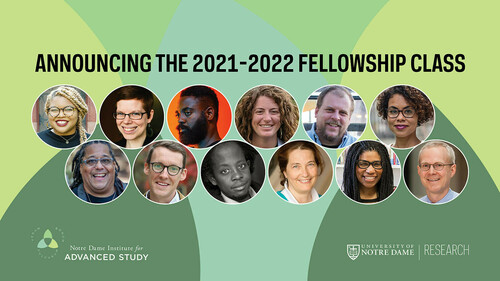
The Notre Dame Institute for Advanced Study (NDIAS) announced its faculty fellowship class for 2021-2022. The 11 residential fellows come from top research universities, including Notre Dame, and have diverse research interests that span the disciplines, including ecology, political science, anthropology, history, food studies and creative nonfiction. They will come together for a year of intensive collaborative research on resilience, the NDIAS’s organizing research theme for 2021-2022.
“The past year has offered us several pivotal lessons about what it means to respond to overwhelming challenges — to our public health, to democratic life, to rapid economic and social disruption,” said Meghan Sullivan, director of the NDIAS and the Wilsey Family College Professor of Philosophy. “The Institute is thrilled to bring together this cohort of scholars to distill key insights that will enable us to respond more creatively, effectively and ethically to future crises we may face.”
The 2021-2022 faculty fellows include:
- Scott Barton, assistant adjunct professor of food studies, New York University (co-sponsored by the Notre Dame Initiative on Race and Resilience)
- Richard Benjamin, creative non-fiction writer and contributing writer for the New Yorker
- Jennifer Forestal, Helen Houlahan Rigali Assistant Professor of Political Science, Loyola University Chicago
- John Golden, Edward S. Knight Chair in Law, Entrepreneurialism and Innovation, The University of Texas School of Law (co-sponsored by the Notre Dame Technology Ethics Center)
- Jason McLachlan, associate professor of biological sciences, University of Notre Dame
- Mary Phillips, assistant professor of Africana studies, Lehman College at the City University of New York
- John Schwenkler, professor of philosophy, Florida State University
- LaKisha Simmons, associate professor of history and women’s studies, University of Michigan
- Rebecca Stumpf, professor of anthropology, University of Illinois at Urbana-Champaign
- Ariel White, Silverman (1968) Family Career Development Associate Professor of Political Science, MIT
- Apryl Williams, assistant professor of communication and media, University of Michigan (co-sponsored by the Notre Dame Technology Ethics Center)
The fellows will be joined by award-winning poet and cultural critic, Reginald Dwayne Betts, who will serve as the NDIAS’s Artist in Residence during the year. Betts is the author of several collections of poetry, including “Felon: Poems,” which was selected as one of the New York Times’ “100 Notable Books of 2020.” A graduate of Yale Law School, Betts is a fierce advocate of criminal justice reform, drawing on his own experiences as a teenager in maximum security prisons. Betts will participate in the research activities of the NDIAS and help teach a class at Notre Dame on race and autobiography. His fellowship is co-sponsored by the Notre Dame Initiative on Race and Resilience.
“We are grateful to the Initiative on Race and Resilience and the Notre Dame Technology Ethics Center for partnering with us on four co-sponsored fellowships this year,” Sullivan said. “The program represents over a year of planning and involvement from many faculty and campus partners and shows Notre Dame’s commitment to bringing inclusive research to bare on our most pressing problems.”
Faculty fellows participate in weekly work-in-progress seminars and receive substantial communication skills training, such as presentation and writing workshops led by Duarte Group and editors from the New York Times, designed to help them develop work that is accessible to broad audiences.
Each fellow also receives a fellowship stipend, a research allowance, subsidized housing and research assistance from a cohort of undergraduate research fellows at the NDIAS. The faculty fellows will also be joined by a group of graduate fellows, who will collaborate with the faculty on research projects related to resilience and receive mentorship and research guidance from them.
The NDIAS will begin accepting applications for 2022-2023 faculty fellowships during the summer of 2021. To learn more about the faculty fellowship program and the institute, please visit ndias.nd.edu/fellowships/faculty.
To stay updated on the latest NDIAS news and events, subscribe to the NDIAS mailing list at ndias.nd.edu/subscribe.
Originally published by at ndias.nd.edu on February 03, 2021.